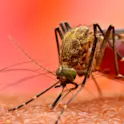
Featured news
10 Aug 2023
New high-tech microscope using AI successfully detects malaria in returning travelers
By Deborah Pirchner, Frontiers science writer Image: Shutterstock.com Malaria is an infectious disease claiming more than half a million lives each year. Because traditional diagnosis takes expertise and the workload is high, an international team of researchers investigated if diagnosis using a new system combining an automatic scanning microscope and AI is feasible in clinical settings. They found that the system identified malaria parasites almost as accurately as experts staffing microscopes used in standard diagnostic procedures. This may help reduce the burden on microscopists and increase the feasible patient load. Each year, more than 200 million people fall sick with malaria and more than half a million of these infections lead to death. The World Health Organization recommends parasite-based diagnosis before starting treatment for the disease caused by Plasmodium parasites. There are various diagnostic methods, including conventional light microscopy, rapid diagnostic tests and PCR. The standard for malaria diagnosis, however, remains manual light microscopy, during which a specialist examines blood films with a microscope to confirm the presence of malaria parasites. Yet, the accuracy of the results depends critically on the skills of the microscopist and can be hampered by fatigue caused by excessive workloads of the professionals doing the […]













